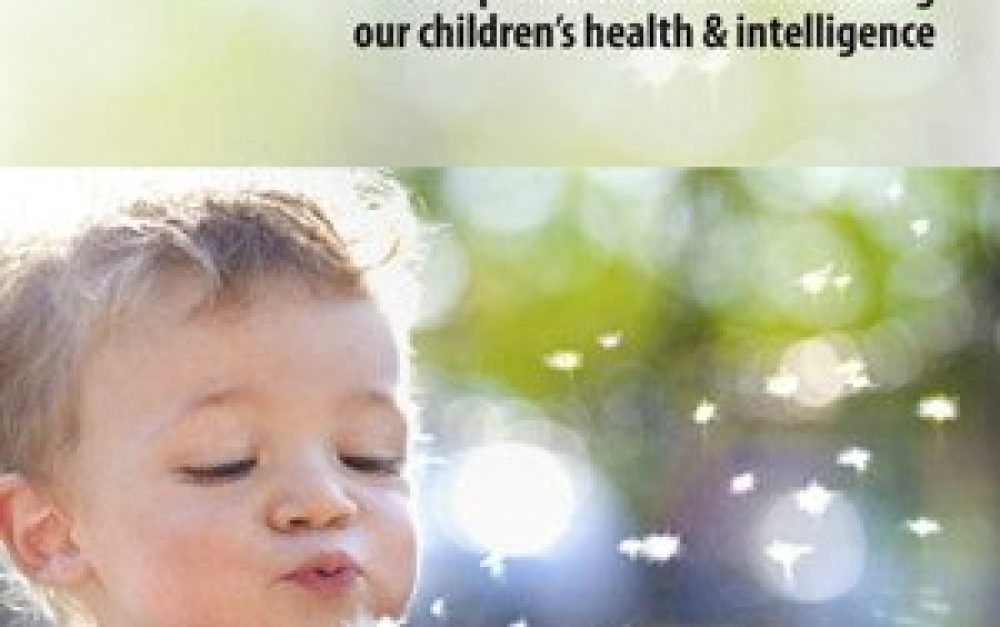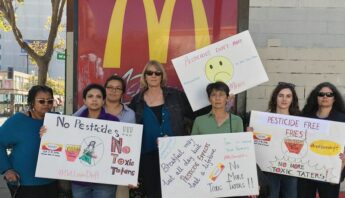We're excited. The report we released earlier this month — A Generation in Jeopardy — is getting people talking about how pesticides are harming our children, and what we can do about it.
A national conversation is a first, important step. Next up? Decisive action that gets harmful pesticides out of kids' daily lives.
Here are just a few examples of how the report is spurring conversations across the country:
In the media: Newspapers and television stations from the New York Times' Greenwire to outlets in Minnesota and California picked up on the story, highlighting the strong science showing a link between pesticide exposure and children's health. When parents in Colorado made the news for refusing to let their children play on a soccer field recently sprayed with a mix of neurotoxicants and potential carcinogens, A Generation in Jeopardy was cited as evidence that the parents had good reason for concern.
Our favorite quote comes from Dr. Warren Porter of the University of Wisconsin:
Their report probably understates what is going on. There are indications now that we are not only altering our kids in terms of their immune, endocrine and nervous system function, but, especially in prenatal exposure, we are seeing significant effects.
Among health professionals: A few days after the report came out, PAN staff scientist and report co-author Emily Marquez discussed the findings via teleconference with members of the Collaborative on Health and the Environment, an international partnership of more than 4,000 health professionals and organizations engaged with environmental health issues. Earlier this week, the American Academy of Pediatrics weighed in on organic food and children, highlighting many of the same childhood health harms linked to pesticides reviewed in PAN's report. Another webinar with health professionals, organized with our partners at the Institute for Agriculture and Trade Policy, is coming up next month.
In communities: More than 2,000 PAN supporters have pledged to begin a conversation in their community about protecting children's health. Using our 2-page Conversation Kickstarter — based on A Generation in Jeopardy's findings — parents, farmers, consumers and activists are bringing their concerns about pesticides and children's health to their friends, colleagues, schools and churches. News of the report also spread online and got people talking via blogging sites like MomsRising.org and Dr. Greene.com.
Both informal and official conversations with policymakers about children's health and pesticides — at state and national levels — are also gaining steam. We truly believe this is how to build momentum for real change: one powerful conversation at a time.
Pesticide industry response? Duck & cover.
Critiques of the report have come mainly from CropLife, the pesticide industry's trade association, and representatives of the Farm Bureau, who are in the habit of being defensive where they don't need to be (the report calls explicitly for more and better support for farmers).
In the spirit of moving forward the national conversation about this important issue, here are the gist of the critiques, and our responses:
"These findings aren't based on peer reviewed studies." In fact, our scientists reviewed more than 200 recent studies from the academic literature. More than 170 of them are cited in the report, and dozens are described in detail in Appendix A. Those few sources that are not peer-reviewed journal articles are mostly government data on public health trends, from agencies such as the Centers for Disease Control and Prevention.
"This is nothing we don't already know." We agree. These are all studies that are already out in the world, data that is publicly available and understood. A Generation in Jeopardy pulls it all together in one place to show how children's health is being affected overall — not one disease or one chemical at a time.
"They are using the spectre of autism to get headlines." Some of the strongest recent science links pesticide exposure to a range of neurodevelopmental effects. We highlight those where the body of evidence is most compelling: attention-deficit/hyperactvity disordier, falling IQs, and yes, autism spectrum disorder. We make quite clear in the report that scientists are now looking to a combination of genetic factors and exposure to chemicals in the environment — including, but not limited to, pesticides — to explain the rising rates of autism and other developmental disabilities among children.
No one is well served by overstating the case linking pesticides and children's health harms, and we've been careful not to do so. The evidence stands quite well enough on its own.
We're thrilled that A Generation in Jeopardy is moving the conversation forward from research findings to policy options and beyond. An honest, evidence-based conversation about children's health and pesticides is the first, important step to making real change.








